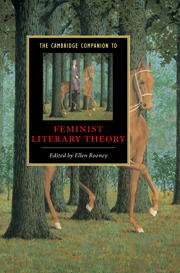Book contents
- Frontmatter
- Introduction
- Part 1 Problematics emerge
- Part 2 In feminism’s wake: genre, period, form
- 4 What feminism did to novel studies
- 5 Autobiography and the feminist subject
- 6 Modernisms and feminisms
- 7 French feminism’s écriture féminine
- 8 Feminism and popular culture
- Part 3 Feminist theories in play
- Index
8 - Feminism and popular culture
from Part 2 - In feminism’s wake: genre, period, form
Published online by Cambridge University Press: 28 November 2006
- Frontmatter
- Introduction
- Part 1 Problematics emerge
- Part 2 In feminism’s wake: genre, period, form
- 4 What feminism did to novel studies
- 5 Autobiography and the feminist subject
- 6 Modernisms and feminisms
- 7 French feminism’s écriture féminine
- 8 Feminism and popular culture
- Part 3 Feminist theories in play
- Index
Summary
The study of popular culture addresses both media texts and cultural practices. This ever-expanding area of scholarship includes film, science fiction, television, romance novels, popular music, magazines: all the seeming ephemera in the public domain that through its popularity remains in production and circulation or has attained a place in cultural memory. As a field that encompasses and interrogates the production, distribution, and interpretation of all popular media forms, this much-maligned discipline demands particularly stringent intellectual and methodological rigor. Feminist interventions in the field have been both inspiring and infuriating. For example, Germaine Greer's three and sixpence purchase of the two romance novels analyzed in The Female Eunuch does not actually misrepresent the genre, but her anecdotal discussion of their impact falls short of the systematic methodology expected in scholarly research in popular culture.
Difficulties in studying popular culture arise from the scale of the mass media, its ephemeral nature, and the paradox of its apparent inconsequence. Feminist analysis of popular culture intensifies the debate over whether popular texts merely reflect society or act as part of the process of mediation in social life. The understanding that popular and mass media texts act as sites of cultural practice, which Greer acknowledges in her discussion, links popular culture directly to ways of thinking, feeling, and acting in the world. The status of these texts as shared cultural reference points that make visible ideologies, discourses, and values is a major topic of feminist analysis. Popular culture constitutes a space of exchange between dominant and subordinate cultures and provides a valuable area of study for those who hope to understand social change.
- Type
- Chapter
- Information
- The Cambridge Companion to Feminist Literary Theory , pp. 172 - 192Publisher: Cambridge University PressPrint publication year: 2006
- 4
- Cited by



